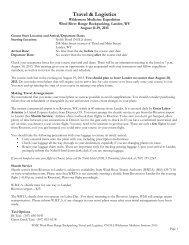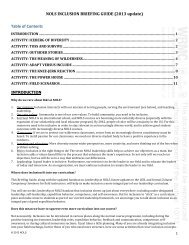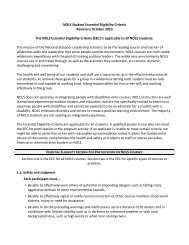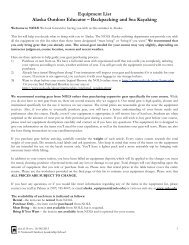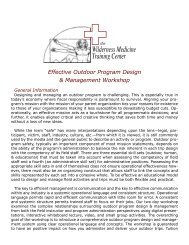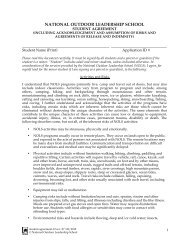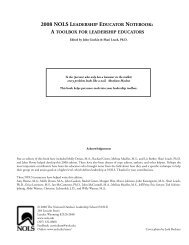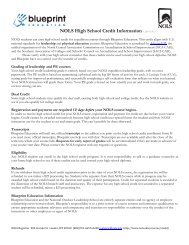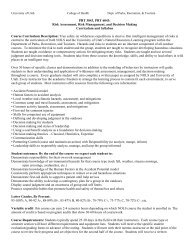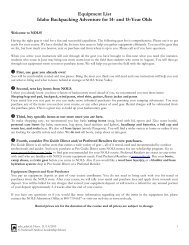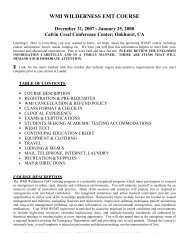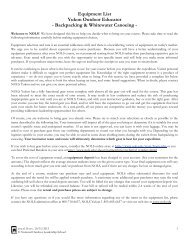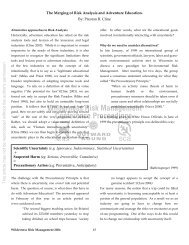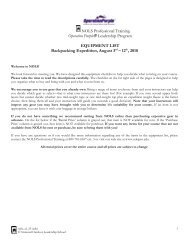Course Description Amazon Basin River Expedition - NOLS
Course Description Amazon Basin River Expedition - NOLS
Course Description Amazon Basin River Expedition - NOLS
Create successful ePaper yourself
Turn your PDF publications into a flip-book with our unique Google optimized e-Paper software.
<strong>Course</strong> <strong>Description</strong><br />
<strong>Amazon</strong> <strong>Basin</strong> <strong>River</strong> <strong>Expedition</strong><br />
Features Of This <strong>Course</strong>:<br />
• Average elevation is between sea level and 500 meters<br />
• Average temperatures range from 20 degrees C to 38 degrees C (60 -100 degrees F)<br />
• Humidity: 80-90%<br />
• Abundant bird and wildlife<br />
• Average Group Ratio: 4 Students / 1 Instructor<br />
• Minimum Age: 18<br />
• Jungle camping in hammocks and/or tents<br />
• Natural history interpretation and tropical medicine considerations and precautions<br />
• Strong inter-cultural aspect: interactions with Brazilians from all walks of life<br />
Join <strong>NOLS</strong> for an expedition to the southern half of the <strong>Amazon</strong> basin. Brazil's share of the <strong>Amazon</strong> has the largest intact<br />
areas of rain forest in the world and also large areas of unique savannah forests known as Cerrado. It is an area with high biodiversity<br />
– one third of all species can be found there – and a great variety of landscapes. <strong>NOLS</strong> Brazil is the only program<br />
that runs extended expeditions in this part of the <strong>Amazon</strong> basin. It is still an exploratory program; students must be ready to<br />
adjust their expectations to the realities of travel in what is still a remote and little developed part of the world.<br />
You will experience some of the incredible diversity of the <strong>Amazon</strong> region. Life is teeming here and there are great<br />
opportunities for observing wildlife such as ants and anteaters, macaws and monkeys and many other species of insects,<br />
mammals or birds. The rivers too are rich in life in the <strong>Amazon</strong> basin. 3,000 of the world’s freshwater fish species are found<br />
there as well mammals such as the pink dolphin and the giant otter.<br />
Brazil is a country with great human and cultural diversity as well. A key part of its history is the blending of many races with<br />
the indigenous inhabitants. In the last 500 years people have settled there from Europe, Africa and Asia. This diversity is<br />
expressed in the great variety of its music, art, cuisine and customs. The people you will meet on your expedition are part of<br />
this rich tapestry. Despite the remoteness and difficulties of travel in vast areas of the <strong>Amazon</strong> basin, there are many<br />
communities of people who make a living there. Meeting these people and sharing a little of their lives will also be a part of<br />
your experience. These people include the ribeirinhos (river dwellers) who live by small-scale agriculture and fishing along the<br />
banks of the rivers, garimpeiros (gold prospectors) who still explore the remotest areas of the <strong>Amazon</strong> basin looking for<br />
minerals, and sometimes seringueros (rubber tappers). And even in your own group you will have the chance to meet<br />
Brazilians –your instructor team will be at least 50% Brazilian!<br />
The <strong>Expedition</strong><br />
This is a 40-day course of which 34 days will be spent in the field, camping and travelling as a self supported expedition. Of<br />
the remaining 6 days, two will be spent in planning and preparations at our base in Chapada dos Guimarães in the state of<br />
Mato Grosso, and the other four days are travel days. Note that the course ends in a different location from our base. Your<br />
journey on the <strong>River</strong> Juruena is taking you constantly further away, and north, to the Equator and the <strong>River</strong> <strong>Amazon</strong>. The<br />
Juruena becomes the <strong>River</strong> Tapajos, one of the great clear-water tributaries of the <strong>Amazon</strong>. You will finish near the city of<br />
Santarem, which is near the confluence of these two huge rivers.<br />
The focus is on developing the leadership and teamwork skills and the technical outdoor skills that will make the expedition a<br />
healthy and enjoyable one. Meeting and living with other people, pushing yourself physically and emotionally, learning about<br />
the natural world, experiencing Brazilian culture and, of course, having fun are all aspects of the <strong>NOLS</strong> Brazil experience.<br />
Your course will take you through a cross section of the southern part of the <strong>Amazon</strong> basin. You will see the highlands,<br />
known as the Brazilian Shield, where the southern tributaries rise, and the lowlands close to the <strong>Amazon</strong> <strong>River</strong> itself.<br />
This course takes place on the Rio Juruena and Rio Tapajós. The Juruena is a large clearwater tributary of the Rio Tapajós<br />
which itself is the 5th largest tributary of the <strong>Amazon</strong> <strong>River</strong>. The Juruena is the 122nd longest river in the world and its<br />
discharge into the Tapajós is greater than the discharge of the <strong>River</strong> Nile. The Juruena rises in the highlands of the Brazilian<br />
shield in the state of Mato Grosso, and there are rapids and significant waterfalls on the section paddled by the course. Part of<br />
the route passes through the Juruena National Park.<br />
amz.cd. rev. 05/05/2012<br />
1<br />
© National Outdoor Leadership School
The route begins on the <strong>River</strong> Juruena at the ferry near Cotriguaçu to the west of the town of Alta Floresta. It ends at the<br />
town of Jacareacanga on the Rio Tapajós.<br />
Daily activities vary from working all day to get around one rapid by carrying all the equipment through the rainforest, to<br />
lining canoes through rock channels and over boulders, to paddling 25-30 miles on calmer waters. Some days might be spent<br />
in the same camp, exploring the surrounding area, visiting with local people, or practicing paddling skills at a rapid. Fishing is<br />
may be possible as well, depending on the river area. The Tucunaré (peacock bass), piranhas, and catfish are all edible and<br />
abundant in some areas of the <strong>Amazon</strong>.<br />
While you are in the field, you’ll live with two or three other students in a “tent group." Your tent group will have its own<br />
stove, food, and tent. You will sleep in tent with your tent group, or possibly alone in a hammock depending on the area. The<br />
tent groups camp near each other, but each group prepares its own meals and handles its own camp chores. Periodically<br />
during the course, tent mates are changed so that you get to live and camp with all the students on the course. We’ll travel as a<br />
large group on the river, navigating rapids and river miles during the day, and camping on the riverside or on rock islands at<br />
night. One of the focuses of the course is wilderness risk management, which includes learning how to avoid injury by<br />
understanding the hazards that are encountered and avoiding illness by practicing good hygiene and self-care. The course will<br />
also feature first aid training specific to tropical wilderness situations.<br />
There will be many wonderful experiences, but the reality of a remote expedition in the tropics is that hard work and 100%<br />
commitment are necessary to make them enjoyable and comfortable. They are learning adventures designed to inspire you<br />
with the skills and experience necessary to travel internationally and set up your own expeditions in the wilderness long after<br />
the end of your course. So keep in mind that the course presents many challenges such as hot and humid weather, bugs in all<br />
their varieties and dense tropical forest to travel through (We’ll be taking bug bite preventative measures, which means using<br />
repellant, long pants and shirts, and staying under bug nets at night when the bugs are more active).The challenge is not always<br />
an intensely physical one. For each participant it will be different; for many the challenge is a mental and emotional one. The<br />
challenge of living together with other people, sharing your life intimately with them, being tolerant and patient, putting the<br />
team’s needs before your own, these are often the greatest challenges on a <strong>NOLS</strong> course. In the <strong>Amazon</strong> region a particular<br />
challenge is simple self-care, maintaining a high standard of personal hygiene without which you become prey to many<br />
infections and diseases. Whatever the challenges, if you come with the right attitude and a willingness to stay cheerful and<br />
positive in the face of all types of adversity your course will be a unique and rewarding experience.<br />
The expedition will be self-sufficient and take place in remote areas. Students will be expected to participate in all aspects of<br />
the expedition from the preparatory stages to being fully involved in expedition leadership. Students must assume a high level<br />
of responsibility for their own self-care and in interacting in a different culture. Students must adjust their expectations to the<br />
realities of Brazil and the <strong>Amazon</strong> Region. Logistical delays are common and part of the experience in an area with little<br />
infrastructure. This course is not for students looking for a relaxing break—it’s for people looking to explore and learn in a<br />
challenging tropical environment.<br />
Expect to learn a lot both informally from soaking up the rich experiences, and from the classes and group meetings that will<br />
be part of the routine of the course. The course will end with written course evaluations and there will also be periodic verbal<br />
evaluations or “check-ins”.<br />
Student Independence<br />
On all <strong>NOLS</strong> courses students will be independent (unaccompanied by instructors) at various times. This will include time in<br />
and around camp such as while cooking or performing camp chores. Instructors may allow students to travel away from camp.<br />
Students often have independent unsupervised time, usually in town, before and after their course starts.<br />
Weather And Other Challenge<br />
There are seasonal variations in the Neotropics that have more to do with rainfall than any great variance in temperatures. The<br />
rainy season varies within the vast <strong>Amazon</strong> basin, which straddles the Equator. In July and August dry weather can be<br />
expected though rainfall will increase as you head north. Conditions can also give rise to bush fires at this time of year. Days<br />
are generally uniform in length (12 hours of daylight from roughly 6 a.m.-6 p.m.) throughout the year. In the Neotropics<br />
temperature and humidity can be very high during the day (up to 100 degrees F and 80-90% humidity) and you will have to<br />
protect yourself from sunburn and dehydration.<br />
amz.cd. rev. 05/05/2012<br />
© National Outdoor Leadership School<br />
2
You should also be prepared for the demands of the tropical forest. Insects are perhaps the most omnipresent aspect of the<br />
tropical fauna; there are mosquitoes, sand flies, sweat bees, wasps, ticks, beetles, butterflies, moths, ants etc., in abundance.<br />
You may have to get up and move camp in the middle of the night because leafcutter ants are snipping up your tent and pack.<br />
You may get multiple bee stings so if you have a bee sting allergy you should inform the Admissions Office about this as soon<br />
as you begin your application. Anyone with previous severe anaphylactic allergic reactions (compromised airway) in their<br />
medical history is asked to not apply for this course, as the possibility of some insect bite during the course is high.<br />
Students should also be aware of the presence of malaria, rabies, yellow fever, dengue, and other less known diseases in the<br />
Brazilian <strong>Amazon</strong> course area. We will be taking precautions to prevent disease transmission, however there is always a risk of<br />
contracting some of these diseases. Despite the risks, we have not had any incidence of these diseases on our courses during<br />
our six years of operations here.<br />
A Yellow Fever vaccine is the only one required before arriving in Brazil to start the course; these vaccinations are good for 10<br />
years. You will also need to use prophylactic anti-malarial medications during the course. More information is provided in the<br />
Travel and Logistics document for this course.<br />
Personal Electronics<br />
A key element to a <strong>NOLS</strong> education is time spent in wilderness. The benefits of this include being closer to nature, time away<br />
from society and civilization, and being in an environment where natural forces predominate and students have the<br />
opportunity to develop good judgment and practice self-reliance. <strong>NOLS</strong> does not permit students to use personal cell or<br />
satellite phones or other communication devices including personal tracking devices (e.g. SPOT), while in the field.<br />
Additionally, students are not permitted to take personal music players (iPods, MP3 players, or camera/music devices such as<br />
iPhones) Instructors will be carrying sufficient communication equipment (usually a satellite phone) to handle any emergencies<br />
that may arise.<br />
Access to Medical Care<br />
Throughout the course we can be miles from the amenities of civilization. Our remoteness also means evacuation to a medical<br />
facility can take up to two or more days. Telephones, ambulances, and hospitals may be several days away. We do carry<br />
satellite phones on courses, but this does not guarantee prompt communication or transport. Learning to manage risks and to<br />
assume responsibility for yourself and your colleagues is an expectation of all students.<br />
Preparation Days<br />
These take place at our base in Chapada dos Guimarães, in the state of Mato Grosso in south central Brazil almost exactly in<br />
the geographic centre of South America. You will go there on the first day of the course. Our base is in a beautiful location<br />
and we have 7 acres of garden, orchard and forest to enjoy. You will be camping at the base using tents or hammocks for two<br />
nights while you do the expedition preparation.<br />
There is a great deal to be done before setting off on an expedition of this length, in such a remote area. During the first day<br />
all the food “rations” for the whole course need to be bagged up and separated. This process takes a full day and involves the<br />
individual bagging of many pounds of bulk food. A second day is devoted to preparing equipment. Your personal gear will be<br />
checked by an instructor who will advise you what to bring and not bring. The gear that is shared by the group such as cook<br />
gear, tents, maps, canoe gear, etc., also needs to be checked and packed. These are busy days with many tasks and chores to<br />
complete, but they are also learning days and you will receive many short lessons on expedition planning.<br />
In the evenings there will orientation talks and maybe slide shows. The base is self-catering and you will also be expected to<br />
help out with meal preparation and cleaning up.<br />
amz.cd. rev. 05/05/2012<br />
© National Outdoor Leadership School<br />
3
General <strong>Course</strong> Objectives<br />
Each course is unique due to variables such as route, group dynamics, fitness levels, and environmental conditions. Working<br />
with these variables, it is our intent to see each student accomplish the following:<br />
Risk Management, Judgment and Decision Making<br />
• Demonstrate knowledge of the hazards in the <strong>Amazon</strong> <strong>River</strong>, forest, and other environments encountered, and practices<br />
that diminish the likelihood of injury due to those hazards.<br />
• Display an awareness of animal and disease risks specific to the <strong>Amazon</strong> and how to minimize those risks.<br />
• Demonstrate sound judgment and decision-making skills based on knowledge of equipment, the wilderness environment,<br />
other expedition members, and one’s own limits.<br />
• Display an ability to prevent, evaluate, and care for medical problems in a wilderness setting.<br />
• Understand the connection between hygiene and health in a tropical environment and practice methods to promote good<br />
health and hygiene.<br />
• Formulate and show the ability to implement contingency plans for groups in the outdoors and in remote areas.<br />
Leadership and Teamwork<br />
• Assume leadership responsibilities in day-to-day logistics and organization of the course.<br />
• Accurately identify personal strengths and skills and areas for growth in developing leadership styles.<br />
• Take initiative in helping to plan your course, teach classes, facilitate discussions, and conduct group meetings.<br />
• Develop the ability to plan and carry out responsible and environmentally sound expeditions while also considering cultural<br />
sensitivity.<br />
• Initiate resolution of interpersonal conflicts.<br />
• Practice high standards of expedition behavior; display a positive attitude despite hardship.<br />
• Make efforts to communicate with all expedition members and develop an atmosphere of mutual respect despite<br />
differences.<br />
Outdoor Skills and Travel<br />
• Travel competently in <strong>Amazon</strong> <strong>River</strong>, forest and Cerrado terrain, learning to camp, cook, and prepare for varied<br />
environmental conditions.<br />
• Use GPS and compass to travel responsibly in challenging rainforest, tropical-river, and savannah terrain.<br />
• Take responsibility for the care and organization of personal and group equipment.<br />
• Be familiar with sources of information on international travel and be able to plan an expedition.<br />
• Be aware of the hazards of traveling in a developing country and how to minimize these hazards.<br />
• Learn and apply basic wilderness first aid skills, hygiene considerations, and self-care.<br />
• Consistently demonstrate sound minimum impact living and travel skills on personal and group levels and be able to apply<br />
this knowledge to varied settings.<br />
Environment and Cultural Studies<br />
• Become familiar with the different cultures of people encountered during the course.<br />
• Show an understanding, appreciation and respect for the natural world; identify typical fauna and flora of the <strong>Amazon</strong><br />
basin’s eco-regions.<br />
• Develop an understanding of land management in Brazil and the problems arising from population and resource pressures<br />
on wilderness areas.<br />
• Demonstrate familiarity with the geographical and cultural diversity of Brazil.<br />
• Consistently be aware of and practice environmental and cultural minimum impact.<br />
<strong>River</strong> <strong>Expedition</strong> Skills<br />
• Learn and practice hazard identification and avoidance in moving water and whitewater.<br />
• Learn basic and advanced tandem canoe strokes and maneuvering techniques.<br />
• Learn basic river rescue techniques and basic and intermediate whitewater skills.<br />
• Learn to manage and implement canoe expedition techniques: lining, walking and portaging canoes.<br />
• Learn to care for, pack, maintain and repair collapsible canoes.<br />
amz.cd. rev. 05/05/2012<br />
© National Outdoor Leadership School<br />
4



